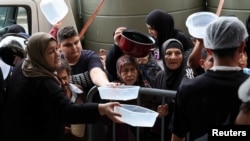U.S. Secretary of State Antony Blinken on Friday urged Israel to take measures to protect civilians and ensure they are not caught “in a terrible crossfire,” as Washington continues its efforts to prevent a broader conflict in the Middle East and seek a diplomatic solution in Lebanon.
This comes as Israeli strikes in Gaza and Beirut resulted in numerous casualties. The Israeli military said it was targeting terrorist operatives.
Blinken said Lebanon’s future is for the Lebanese people to decide, not for any external actor.
“It’s clear that the people of Lebanon have an interest, a strong interest, in the state asserting itself and taking responsibility for the country and its future. The presidency has been vacant for two years now, and for the Lebanese people having a head of state would be very important, but that’s for the Lebanese to decide, and no one else,” Blinken told reporters during a news conference in Vientiane, Laos.
U.S. officials have reiterated that Israel has the right to defend itself against terror attacks from Hamas and Iran-backed Hezbollah, as Israel expands its ground incursion into Lebanon.
On Thursday, an Israeli airstrike on a school in Gaza sheltering displaced people killed at least 27 people, according to Palestinian medical officials.
Israel said the strike targeted militants in a command center that was embedded inside the school.
In the Lebanese capital, an Israeli airstrike hit a building in the central part of the city — far from the Hezbollah stronghold south of Beirut that Israel has bombarded nightly for the past two weeks.
The Lebanese Health Ministry put the death toll at 22 and 117 injured, but it was expected to rise as rescuers sifted through the rubble.
The Lebanese Health Ministry put the death toll at 22 and 117 injured, but it was expected to rise as rescuers sifted through the rubble.
Israeli and Lebanese media speculated that the likely target was Wafiq Safa, the longtime head of Hezbollah’s Liaison and Coordination Unit. There was no immediate confirmation that he was the target or if he was killed.
The Israel Defense Forces, or IDF, said Thursday that Hezbollah fired approximately 190 projectiles into Israel during the preceding 24 hours.
The IDF has warned residents in about 100 villages and neighborhoods, mostly in south Lebanon, to evacuate “until further notice.” The United Nations says a quarter of the country’s population is currently displaced.
UN peacekeepers wounded
Separately, the U.N. peacekeeping force in south Lebanon, known as UNIFIL, said its headquarters in the town of Naqoura came under Israeli tank fire early Thursday. An observation tower was hit, causing two Indonesian peacekeepers to fall to the ground, sustaining injuries that required hospitalization.
Israel’s military said it is looking into the incident.
The White House said the U.S. was deeply concerned by the report and was pressing Israel for details.
“The IDF’s indiscriminate attacks against UNIFIL, which wounded two of our peacekeepers, clearly demonstrates how Israel positioned itself above international law, above impunity and above our shared values of peace,” Hari Prabowo, Indonesia’s Deputy U.N. ambassador, said Thursday at an emergency meeting of the U.N. Security Council on the escalating situation in Lebanon.
U.N. peacekeeping chief Jean-Pierre Lacroix said that shortly before beginning their ground operations in Lebanon on October 1, the IDF had urged UNIFIL to vacate their positions within 5 kilometers (3 miles) of the demarcation line between Lebanon and Israel, known as the Blue Line.
“Our peacekeepers have remained in position, in line with the mandate this council has provided, while continuously reassessing the force’s posture against prevailing risks,” Lacroix said.
UNIFIL has over 10,000 peacekeepers from more than 50 countries in south Lebanon, and their boss said this was not the first incident that put them in jeopardy. While the force has taken some mitigation measures, they will remain, Lacroix said.
Region waits
Meanwhile, the region waits to see when and how Israel will retaliate against Iran for a large ballistic missile strike on October 1, and whether it will tip the region into a wider war.
Israel’s war Cabinet was reported to be meeting Thursday night to sign off on its response.
Israel’s defense minister said in a post Wednesday on X on that their retaliation would be “deadly, precise and surprising.”
“Those who try to harm the State of Israel will pay a price,” Yoav Gallant wrote in Hebrew.
U.S. President Joe Biden has said he would not support an Israeli strike on Iran’s nuclear sites.
He spoke by phone with Prime Minister Benjamin Netanyahu on Wednesday to discuss the regional situation.
After a period of relative calm, Hezbollah began firing rockets at Israel following Hamas’ October 7, 2023, terror attack on Israel, displacing tens of thousands on both sides of the border and leading to the current escalation.
In Israel, about 1,200 people were killed in the Hamas attack that triggered the yearlong war in Gaza. Some 250 people also were taken hostage, with about 100 of them still being held.
Israel’s military campaign of air and ground attacks in Gaza has killed more than 42,000 Palestinians and wounded more than 97,700, according to the Gaza Health Ministry. The ministry does not differentiate between militants and civilians but has said just more than half were women and children.
Both Hamas and Hezbollah have been designated terrorist organizations by the United States, United Kingdom, European Union, Israel and others.
VOA U.N. correspondent Margaret Besheer, VOA White House bureau chief Patsy Widakuswara and VOA reporter Natasha Mozgovaya contributed to this report. Some information for this story came from The Associated Press, Agence France-Presse and Reuters.



